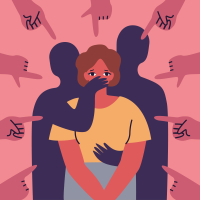
Key messages
• We found evidence that psychological or social (collectively known as ‘psychosocial’) interventions may reduce symptoms of post-traumatic stress disorder (PTSD) and depression in survivors of rape, sexual assault and abuse experienced during adulthood.
• Our review suggests that interventions did not worsen symptoms or lead to unwanted effects. However, as large numbers of participants dropped out of treatments or did not complete studies’ assessments, these findings are unclear. More recent studies were better at reporting information about participant safety, and reasons why survivors did not complete treatments or health and wellbeing assessments after the interventions.
• As the studies brought diverse groups of participants together, future research is needed to improve understanding about which interventions are most suited to particular groups of survivors, including those with long-term or complex trauma, as well as men and gender minorities. 'Emerging' interventions, which have potential to expand treatment choices for survivors, also warrant more evaluation.
What is 'sexual violence and abuse'?
‘Sexual violence and abuse’ means any sexual activity or act that happened without consent. It includes rape, sexual assault, sexual abuse and sexual harassment. It causes emotional and physical health problems that can be long-lasting. The effects are often made worse by fear, shame, feelings of self-blame and the negative responses of others.
How is sexual violence and abuse treated?
Survivors have a range of physical, sexual health and forensic care needs in the aftermath of rape, sexual assault or abuse. Psychosocial interventions may be offered in response to these needs at different stages in survivors’ recovery journeys. Some interventions aim to assist survivors by carefully re-exposing them to aspects of the original trauma to ‘process’ what happened (e.g. Trauma-focused Cognitive Behavioural Therapy (CBT)). Other treatments focus less on the traumatic memories, instead helping survivors cope with life after abuse (e.g. different forms of counselling; education about mental health; and support for a range of needs).
What did we want to find out?
We wanted to know whether psychosocial interventions help to relieve the mental health impact experienced by survivors as a result of rape, sexual assault or sexual abuse in adulthood. We also wanted to know if some types of interventions were more helpful than others.
What did we do?
We searched for studies comparing the effects of psychosocial interventions for individuals who had been subjected to rape, sexual assault or sexual abuse from the age of 18 years, with a control group (a group of participants who did not receive the intervention but instead were given their usual care, were placed on a waiting-list for treatment, or received very minimal assistance, such as leaflets). We looked for differences between groups on trauma and depression symptoms after receiving the intervention; dropout from interventions (non-completion); and any unwanted effects related to the intervention or research.
About the studies and their participants
We found 36 studies that placed consenting adult participants by chance into an intervention or a control group. Participants were invited from a range of settings: community; universities; places where people seek help for their mental health, sexual trauma (e.g. specialist sexual assault centres and emergency departments) or for problems that occur alongside the experience of sexual violence (e.g. primary care clinics); and via media requests. The studies included 3992 survivors; only 27 were men. Sixty per cent of participants were Black or from a minority ethnic or cultural background. The average age was 36 years, and nearly all had symptoms of PTSD.
Most studies were done in the USA (26); there were two from South Africa; two from the Democratic Republic of the Congo; and single studies from Australia, Canada, the Netherlands, Spain, Sweden and the UK. Five studies did not disclose a funding source; those that did reported public funding.
Over half the interventions were CBT-based. Support was mostly delivered one-to-one by trained mental health professionals and varied between 1 and 20 sessions.
What did we find?
Survivors who participate in a psychosocial intervention may experience a large reduction in PTSD and depression symptoms soon after the intervention is completed. Non-completion was not more common among survivors who experienced interventions compared to control groups, but this was based on a small number of studies. Psychosocial interventions may not increase the risk of unwanted effects. Only seven studies reported 21 unwanted effects, suggesting most researchers may not have actively monitored the negative impacts of interventions or participation in the studies.
What are the limitations of the evidence?
We have little confidence in the results because of concerns about the level of variation across the studies (e.g. types of survivor experiences, wide range of interventions and study sizes). It is possible that the allocation of survivors to one group or another may not have been entirely random. Furthermore, survivors who did not complete interventions or study assessments may have differed in important ways from survivors who did (e.g. had better/worse health problems).
How up-to-date is the evidence?
The evidence is up-to-date to January 2022.

